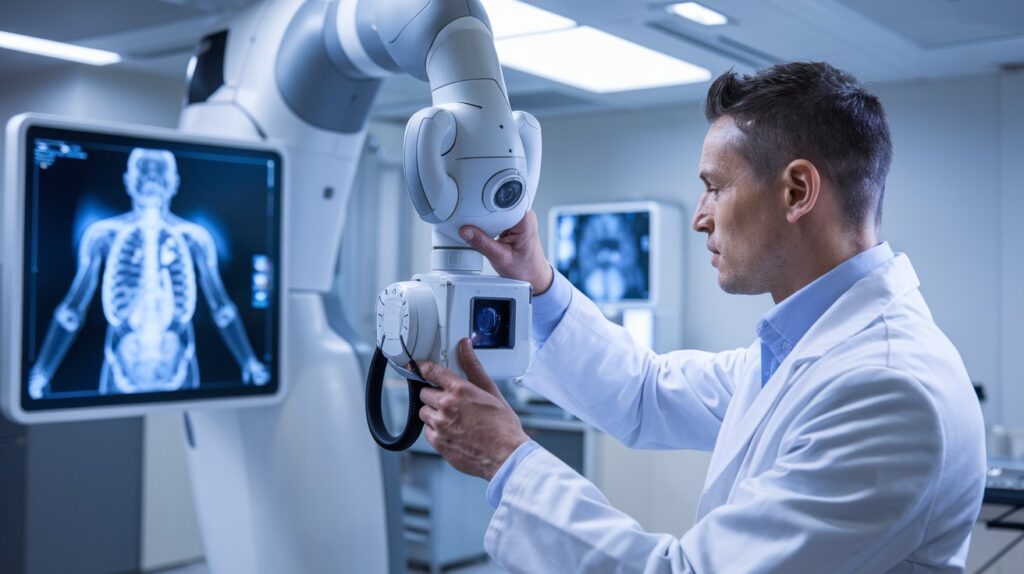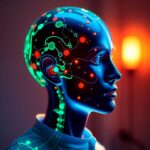Artificial Intelligence (AI) is starting to change the landscape of healthcare, especially in diagnostics. With AI-driven tools enhancing the accuracy and speed of medical diagnoses, the healthcare industry is undergoing a significant transformation. AI algorithms are now utilized to analyze medical images, including X-rays, MRIs, and CT scans, offering doctors critical insights that facilitate quicker and more precise diagnoses. This shift is having a profound effect on the detection of serious diseases such as cancer, heart disease, and neurological disorders, which can be life-altering for patients.
The Role of AI in Medical Imaging:
Medical imaging has always been central to diagnosis in healthcare. However, traditional image analysis methods can be slow and are often subject to human error. AI algorithms, especially deep learning models, have shown great promise in improving image analysis. By training on extensive datasets of labeled medical images, AI systems can recognize patterns and spot abnormalities with impressive accuracy.
Key Benefits of AI in Medical Diagnostics:
- Enhanced Accuracy: AI tools can evaluate medical images with a high level of precision, reducing the likelihood of misdiagnosis.
- Quicker Results: AI algorithms can analyze images significantly faster than human radiologists, resulting in swifter diagnoses and prompt treatment for patients.
- Early Disease Detection: AI’s capability to detect subtle irregularities enables earlier identification of life-threatening conditions like cancer, which can be crucial for saving lives.
- Minimized Human Error: AI algorithms are immune to fatigue or bias, providing consistent and dependable image analysis.
- Cost Efficiency: By automating the image analysis process, AI alleviates the burden on healthcare professionals, streamlining operations and reducing costs.
AI has demonstrated significant potential in the detection of cancers, especially within the field of radiology. For instance, algorithms powered by AI are currently utilized to identify breast cancer in mammograms, lung cancer in chest X-rays, and brain tumors in MRIs. By examining medical images, these AI tools can spot even the tiniest signs of abnormalities, such as tumors or lesions, that might be overlooked by human doctors. Early detection is vital in cancer treatment, as it often results in improved patient outcomes.
Research indicates that AI algorithms can occasionally surpass radiologists in diagnosing certain types of cancer. This is particularly crucial in areas where there is a lack of qualified radiologists, as AI can bridge that gap and provide timely diagnoses.
AI for Faster and Accurate Diagnostics in Heart and Neurological Diseases:
Beyond cancer, AI is also proving to be beneficial in diagnosing heart conditions and neurological disorders. AI-driven tools assist cardiologists in identifying heart disease by analyzing ECG readings, cardiac MRIs, and CT scans. Likewise, AI is improving the detection of neurological diseases, such as Alzheimer’s and Parkinson’s, through the analysis of brain scans. By aiding in the early identification of these conditions, AI facilitates timely intervention and treatment, greatly enhancing the quality of life for patients.

AI in Radiology: The Next Frontier:
The incorporation of AI into radiology is revolutionizing the analysis of images. From the automatic detection of abnormalities to accurate image interpretation, AI tools are streamlining the work of radiologists. These AI-based systems are designed to highlight potential issues in images, allowing radiologists to concentrate on more complex cases. This partnership between AI and human professionals is anticipated to become the norm in the near future, leading to improved patient outcomes.
AI-Powered Diagnostics: The Future of Healthcare:
As AI technology advances, its impact on diagnostics is set to expand significantly. In the near future, we can anticipate even more advanced AI-driven diagnostic tools capable of analyzing not just images but also various types of medical data, including genetic information, lab results, and patient histories. This will empower healthcare professionals to make more personalized and precise treatment decisions, enhancing patient care.
AI is poised to become a vital component of healthcare, particularly in diagnostics. By increasing the speed, accuracy, and reliability of disease detection, AI is playing a crucial role in saving lives and alleviating the strain on healthcare systems around the globe.
Conclusion:
AI-powered diagnostics is transforming the healthcare landscape. With its ability to analyze medical images quickly and accurately, AI is enhancing disease detection and facilitating faster, more effective treatments. As AI technology continues to progress, the potential to revolutionize healthcare grows. With ongoing advancements in AI algorithms, we can look forward to even more breakthroughs in the early detection and treatment of diseases, ultimately saving lives and improving patient outcomes.


Pingback: Multimodal AI Models: The Future of Artificial Intelligence - TechOneDaily
Pingback: AI in Mental Health: How AI is Transforming Diagnosis & Therapy - TechOneDaily
Pingback: AI in Telemedicine: Revolutionizing Healthcare from a Distance - TechOneDaily
Pingback: Ambient Listening and Clinical Documentation Automation: Revolutionizing Healthcare Workflows in 2025 - TechOneDaily